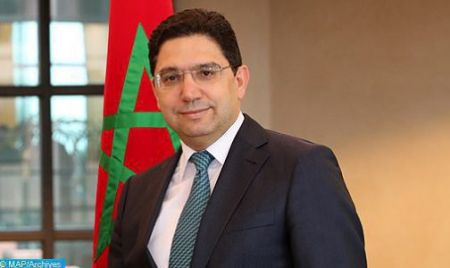Morocco, South Africa Called Upon to Strengthen their Cooperation – FM –
It is now more important for Morocco and South Africa to work to multiply, reciprocally, the opportunities to better understand the political, economic and geopolitical realities of one another, said the Minister of Foreign Affairs, African Cooperation and Moroccans Abroad, Nasser Bourita. “I strongly believe that the strengthening of ties between South Africa and Morocco will be for the benefit of the continent,” Bourita said in an exclusive interview with The Star, one of South Africa’s leading newspapers, published on Monday. “Morocco believes that working together, in a sound and well-balanced manner, will empower Africa in the international arena,” he stressed, adding that the Kingdom has been “calling for more effective solidarity, co-operation and co-ordination in Africa, to enable our continent to be more resilient and well-prepared for contingencies and emergencies.” “We continue to work towards stronger relations with Pretoria,” Mr. Bourita underlined. “Both South Africa and Morocco are recognized as major actors and players in the continent and beyond. They have every interest in taking advantage of the enormous potential they hold.” Morocco and South Africa are “called upon to play major roles in the African integration process,” said Morocco’s FM, who explained that the two countries have been “the largest investors in the continent, and the largest in their respective regions.” In the same respect, Mr. Bourita indicated that “Morocco and South Africa are among the very few African countries that currently have the tools and the know-how to efficiently address the needs of the African continent in COVID vaccines and medical equipment.” Concerning the two African countries’ common history, The Star recalled that “the Kingdom of Morocco was among the staunchest supporters of the African National Congress (ANC).” In this consideration, Mr. Bourita specified that “Nelson Mandela and South African freedom fighters used to train in the eastern part of Morocco, between the cities of Oujda and Berkane.” Mr. Bourita argued that “the existence of differences in opinion is a healthy thing. But, the attitude of our brothers in Pretoria on the issue of the Moroccan Sahara, unfortunately, has too often gone beyond a difference of opinion but has been of adversity.” “Morocco has always been open to dialogue, as long as it is a dialogue of mutual respect and a sincere desire to clean up relations and bring them to their full potential,” the minister added. When asked about the issue of the Moroccan Sahara, Mr. Bourita noted that “since 2007, all UN Security Council resolutions, including the latest one, resolution 2548, have supported the Moroccan approach by underlining the preeminence of the initiative for autonomy, its seriousness and its credibility.” “As a matter of fact, the autonomy plan is the one and only way forward for a final solution to this regional dispute, namely autonomy under Moroccan sovereignty,” he added. The Moroccan Foreign minister stressed the imperative of being “mindful of the realities on the ground including the increasing number of countries that recognize the Kingdom’s full sovereignty over its Sahara.” In this regard, he specified that “fifty countries from all continents have expressed unequivocal support for the Moroccan Initiative for Autonomy in the Sahara. Twenty-five countries from Africa, Asia and the Americas have opened consuls general in the two main cities of the Moroccan Sahara; Laayoune and Dakhla.”

